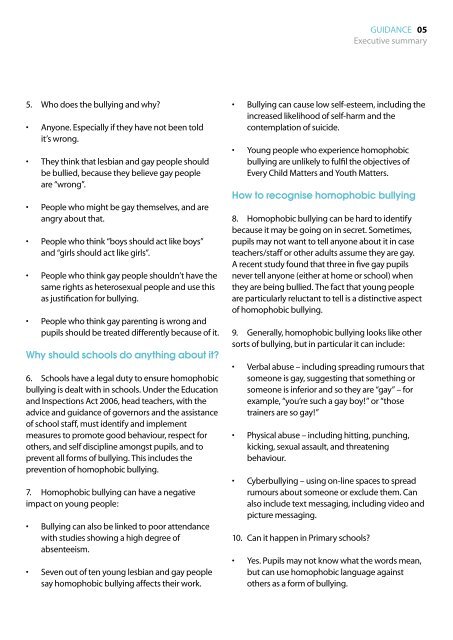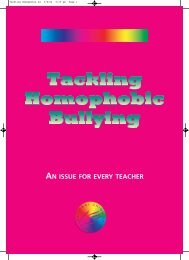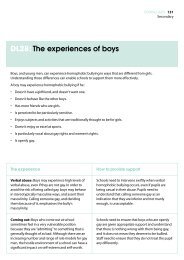Non-Normative Gender and Sexual Identities in Schools: - Schools Out
Non-Normative Gender and Sexual Identities in Schools: - Schools Out
Non-Normative Gender and Sexual Identities in Schools: - Schools Out
Create successful ePaper yourself
Turn your PDF publications into a flip-book with our unique Google optimized e-Paper software.
GUIDANCE 05<br />
Executive summary<br />
5. Who does the bully<strong>in</strong>g <strong>and</strong> why?<br />
• Anyone. Especially if they have not been told<br />
it’s wrong.<br />
• They th<strong>in</strong>k that lesbian <strong>and</strong> gay people should<br />
be bullied, because they believe gay people<br />
are “wrong”.<br />
• People who might be gay themselves, <strong>and</strong> are<br />
angry about that.<br />
• People who th<strong>in</strong>k “boys should act like boys”<br />
<strong>and</strong> “girls should act like girls”.<br />
• People who th<strong>in</strong>k gay people shouldn’t have the<br />
same rights as heterosexual people <strong>and</strong> use this<br />
as justification for bully<strong>in</strong>g.<br />
• People who th<strong>in</strong>k gay parent<strong>in</strong>g is wrong <strong>and</strong><br />
pupils should be treated differently because of it.<br />
Why should schools do anyth<strong>in</strong>g about it?<br />
6. <strong>Schools</strong> have a legal duty to ensure homophobic<br />
bully<strong>in</strong>g is dealt with <strong>in</strong> schools. Under the Education<br />
<strong>and</strong> Inspections Act 2006, head teachers, with the<br />
advice <strong>and</strong> guidance of governors <strong>and</strong> the assistance<br />
of school staff, must identify <strong>and</strong> implement<br />
measures to promote good behaviour, respect for<br />
others, <strong>and</strong> self discipl<strong>in</strong>e amongst pupils, <strong>and</strong> to<br />
prevent all forms of bully<strong>in</strong>g. This <strong>in</strong>cludes the<br />
prevention of homophobic bully<strong>in</strong>g.<br />
7. Homophobic bully<strong>in</strong>g can have a negative<br />
impact on young people:<br />
• Bully<strong>in</strong>g can also be l<strong>in</strong>ked to poor attendance<br />
with studies show<strong>in</strong>g a high degree of<br />
absenteeism.<br />
• Seven out of ten young lesbian <strong>and</strong> gay people<br />
say homophobic bully<strong>in</strong>g affects their work.<br />
• Bully<strong>in</strong>g can cause low self-esteem, <strong>in</strong>clud<strong>in</strong>g the<br />
<strong>in</strong>creased likelihood of self-harm <strong>and</strong> the<br />
contemplation of suicide.<br />
• Young people who experience homophobic<br />
bully<strong>in</strong>g are unlikely to fulfil the objectives of<br />
Every Child Matters <strong>and</strong> Youth Matters.<br />
How to recognise homophobic bully<strong>in</strong>g<br />
8. Homophobic bully<strong>in</strong>g can be hard to identify<br />
because it may be go<strong>in</strong>g on <strong>in</strong> secret. Sometimes,<br />
pupils may not want to tell anyone about it <strong>in</strong> case<br />
teachers/staff or other adults assume they are gay.<br />
A recent study found that three <strong>in</strong> five gay pupils<br />
never tell anyone (either at home or school) when<br />
they are be<strong>in</strong>g bullied. The fact that young people<br />
are particularly reluctant to tell is a dist<strong>in</strong>ctive aspect<br />
of homophobic bully<strong>in</strong>g.<br />
9. Generally, homophobic bully<strong>in</strong>g looks like other<br />
sorts of bully<strong>in</strong>g, but <strong>in</strong> particular it can <strong>in</strong>clude:<br />
• Verbal abuse – <strong>in</strong>clud<strong>in</strong>g spread<strong>in</strong>g rumours that<br />
someone is gay, suggest<strong>in</strong>g that someth<strong>in</strong>g or<br />
someone is <strong>in</strong>ferior <strong>and</strong> so they are “gay” – for<br />
example, “you’re such a gay boy!” or “those<br />
tra<strong>in</strong>ers are so gay!”<br />
• Physical abuse – <strong>in</strong>clud<strong>in</strong>g hitt<strong>in</strong>g, punch<strong>in</strong>g,<br />
kick<strong>in</strong>g, sexual assault, <strong>and</strong> threaten<strong>in</strong>g<br />
behaviour.<br />
• Cyberbully<strong>in</strong>g – us<strong>in</strong>g on-l<strong>in</strong>e spaces to spread<br />
rumours about someone or exclude them. Can<br />
also <strong>in</strong>clude text messag<strong>in</strong>g, <strong>in</strong>clud<strong>in</strong>g video <strong>and</strong><br />
picture messag<strong>in</strong>g.<br />
10. Can it happen <strong>in</strong> Primary schools?<br />
• Yes. Pupils may not know what the words mean,<br />
but can use homophobic language aga<strong>in</strong>st<br />
others as a form of bully<strong>in</strong>g.







